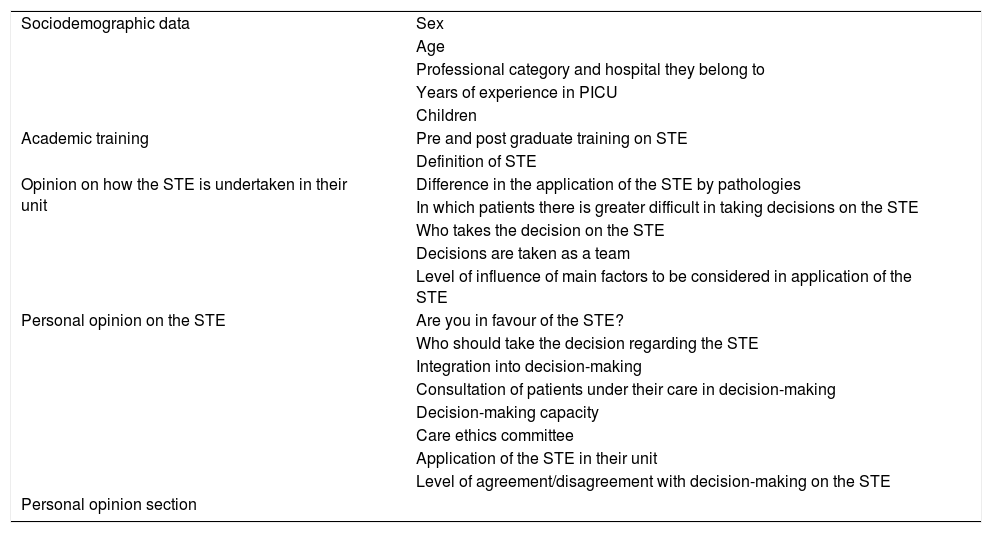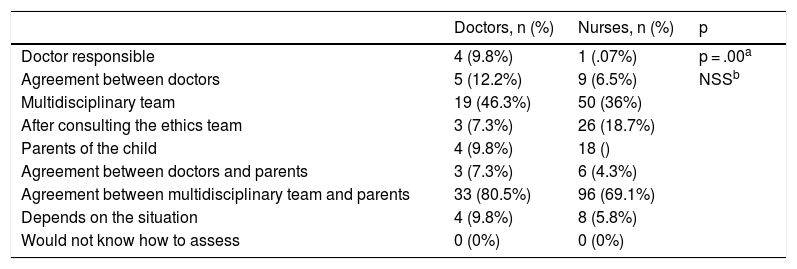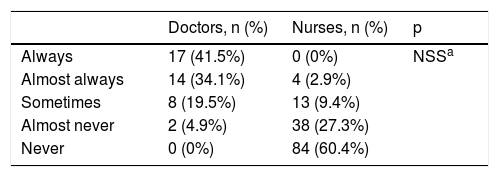To determine the opinion and describe the attitude of different health professionals on suitability of therapeutic effort.
MethodMulti-centre, cross-sectional observational study carried out with nurses and doctors who work in the paediatric intensive care units of four hospitals in the Madrid region. A self-administered questionnaire, previously piloted to assess its viability, was used and a sealed box was set up at the nursing station to hand it in. The analysis was performed using SPSS 21.0 software.
Results98.9% of the respondents were in favour of suitability of therapeutic effort. Doctors consider that the decision is made with the agreement of the multidisciplinary staff and the child’s parents (48.8%). Of the nurses, 51.1% believe that the decision is made by agreement with the doctors and parents. Of the nurses, 65.5% state that they are never asked about decision-making for their patients. Of the doctors, 75% are always or almost always asked. Fifty-seven percent of the nurses and 83% of the doctors feel capable of making decisions about suitability of therapeutic effort. Of the professionals, 77.2% believe that suitability is used less often than required.
ConclusionsThere are differences between doctors and nurses both in the perception of the decision-making model and in the way to proceed. Professionals seem not to follow any protocols or circuits in the decision-making process.
Conocer la opinión y describir la actitud ante la adecuación del esfuerzo terapéutico de diferentes profesionales sanitarios.
MétodoEstudio multicéntrico, observacional y transversal realizado con enfermeras y médicos que desarrollan su labor asistencial en las unidades de cuidados intensivos pediátricos de cuatro hospitales de la Comunidad de Madrid.
Se utilizó un cuestionario de elaboración propia pilotado para valorar su viabilidad y se habilitó una urna clausurada en el control de enfermería para que fuera depositado. El análisis se realizó con el programa SPPS 21.0.
ResultadosEl 98,9% de los encuestados declaró estar a favor de la adecuación del esfuerzo terapéutico. Los médicos consideran que la decisión se toma por consenso del equipo multidisciplinar más los padres del niño (48,8%). El 51,1% de las enfermeras opinan que se realiza por consenso de los médicos más los padres y el 65,5% afirma que nunca les consultan en la toma de decisiones de pacientes a su cargo. Al 75% de los médicos siempre o casi siempre les consultan. El 57% de las enfermeras y el 83% de los médicos se sienten capacitados para la toma de decisiones sobre AET. El 77,2% de los profesionales cree que la adecuación se aplica en menos ocasiones de las necesarias.
ConclusionesExisten diferencias entre médicos y enfermeras tanto en la percepción del modelo de toma de decisiones como en el modo de actuación. Los profesionales no siguen ningún protocolo ni circuito de toma de decisiones consensuado.












